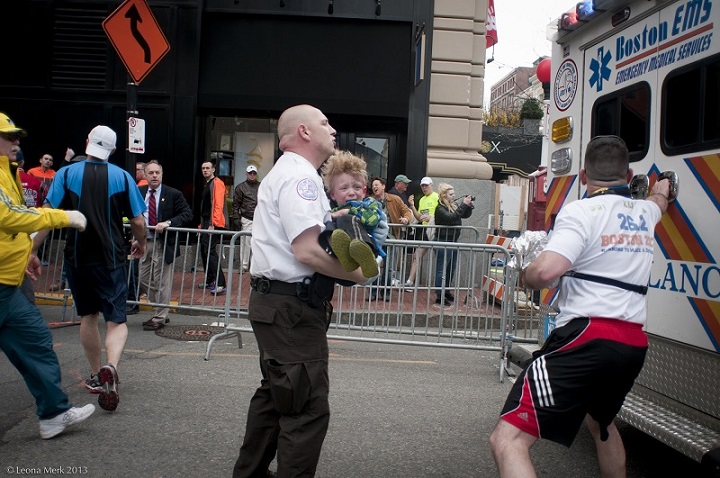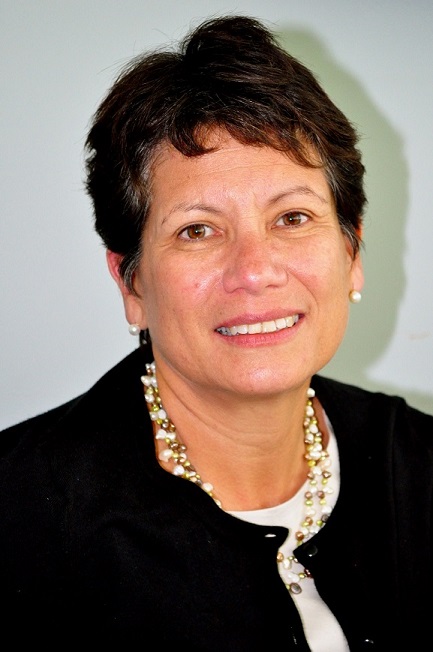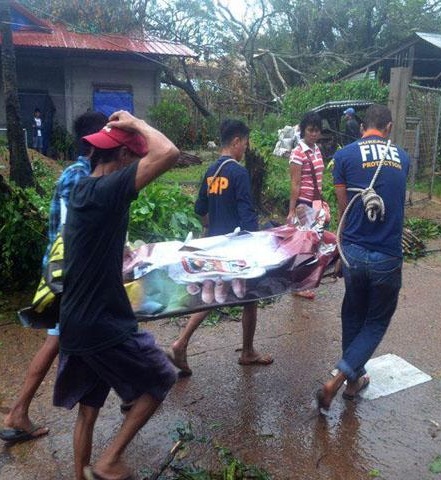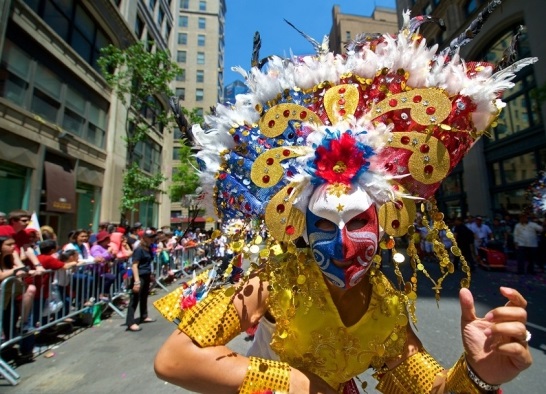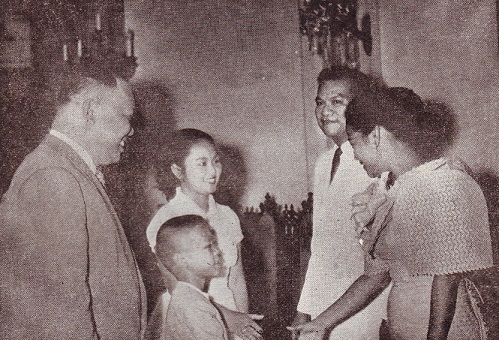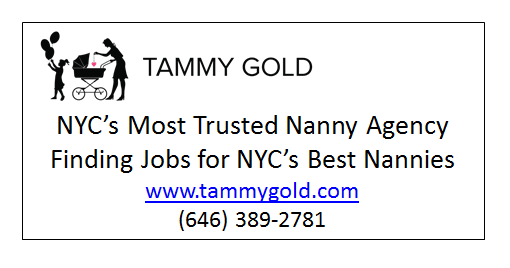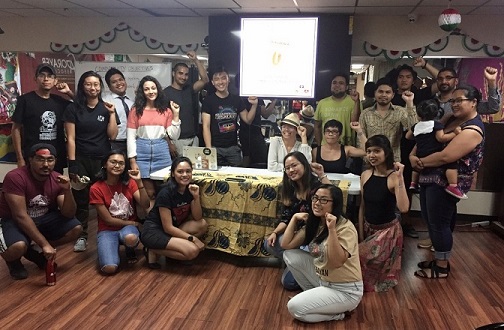‘What do we do if ICE comes to our house?’ and other DACA questions FilAms ask
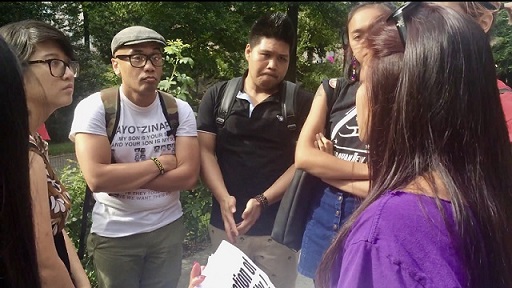
After nearly three hours of marching, the group of Filipinos stepped out of the chanting crowd in Central Park to discuss next steps. Photos by Mariel Padilla.
Standing in a circle, holding hands and chanting, “it is our duty to fight for our freedom; we have nothing to lose but our chains,” a room full of Filipino activists ended a two-hour-long emergency DACA meeting on Friday, Sept. 8.
Members of the National Alliance for Filipino Concerns (NAFCON), Anakbayan New Jersey, Migrante International, International Migrants Alliance and New Jersey City University Dreamers met to discuss problems and brainstorm solutions three days after the Trump administration announced the end of the Deferred Action for Children Arrivals (DACA) immigration policy.
Anakbayan is a Filipino youth organization and Migrante is a global alliance for overseas Filipinos.
Established in 2012, DACA provides more than 800,000 immigrants, who entered the country illegally as minors, protection from deportation and employment authorization for a limited period.
According to the Migration Policy Institute, there were 22,000 Filipinos eligible for DACA as of 2016, making them the ninth largest eligible population in the country. Rescinding DACA puts approximately 6,000 Filipinos at risk.
Many of these recipients, their families, immigrant rights advocates and employers have been reaching out for legal counsel, according to immigration attorney Cristina Godinez. The DACA recipients, often referred to as “Dreamers,” are not at risk for deportation until March 2018.
“They worry about their ability to remain in the U.S. in six months,” Godinez said. “In practical terms, they are being pushed back into the shadows with the rest of the 11 million undocumented population.”
On Saturday, Sept. 9, NAFCON joined thousands of protesters to defend DACA. About 20 Filipinos showed up with signs that read: “End Forced Migration #DefendDACA.”
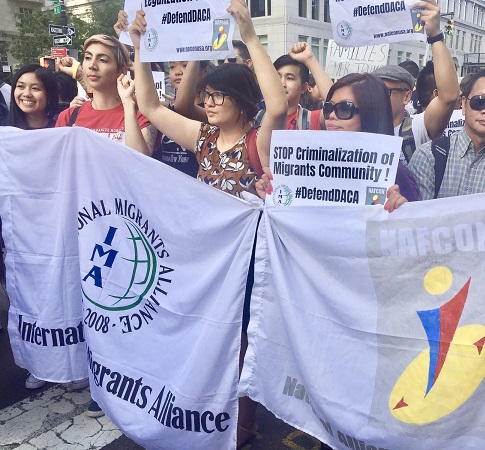
Marching behind the NAFCON and IMA flags, a group of Filipinos united to protest the rescinding of DACA.
Zarah Vinola, NAFCON secretary of Community Affairs, reminded everyone to stick together, keep moving and let the designated marshals interact with any police. Meanwhile, Anakbayan New Jersey member Laura Austria passed around a Sharpie, encouraging people to write the National Lawyers Guild’s phone number on their arms in case of arrest.
After all arms were marked and posters distributed, the small Filipino group entered the chanting throng at Columbus Circle. There were Antifa flags, Humanistic Jews stickers, Doctors 4 DACA t-shirts and a Trump effigy.
Cameras flashed and police officers paced at the edge of the crowd outside Trump International Hotel and Tower. There were drums, singing and chanting as the protestors marched up Central Park West. As the march progressed, Vinola made sure the small group of Filipinos stayed together, walking behind the NAFCON flags.
As a public school teacher, Vinola teaches her predominantly immigrant students about why legislation is passed and the connection it has in terms of the students’ own diaspora in the U.S.
“Our job as educators is not just to protect and defend our students, but to empower them so they are taking up this fight in their own hands” Vinola said.
She mentioned public schools in the area already getting visits from Immigration and Customs Enforcement (ICE), but principals are refusing them entry without warrants.
Godinez said: “These [Dreamers] have the drive of an immigrant and the advantage of being integrated into American society. They are earning, go to school and pay their taxes. They’re part of the economic fabric, and you cannot discount the value of their contribution.”
Before dispersing after the Defend DACA march, Vinola gathered the small group of Filipinos for a traditional unity clap and yelled, “isang bagsak,” which translates to “one fall.” Also known as the common heartbeat, the unity clap reminds the Filipinos that they fall and rise together. According to Austria, it signifies moving forward.
“The immigration system is broken in so many places, and the gaps created by the federal law are filled by local legislation,” Godinez said. “Small patchworks of localities actually make a stand for the DACA person.”
“We are outraged by this DACA decision,” Vinola said. “We will do everything on our part to keep the schools safe for our immigrant students.”
NAFCON and Anakbayan New York hosted a town hall and community response meeting on Sunday, Sept. 17 to address the question: how will the DACA repeal impact Filipinos?
An immigration lawyer explained how to renew DACA, a NAFCON member spoke about systemic injustice, and an Anakbayan member called for more boldness and militancy.
Sitting in folding chairs, 25 to 30 community members attentively watched the panelists’ PowerPoint presentation before voicing their concerns: “What will happen to DACA recipients who have American-born children?,” “How can we get non-DACA Filipinos to care?,” “What do we do if ICE comes to our house?”
When a member of the audience asked about available resources, panelist and Anakbayan New York member Danica Pagulayan said: “Don’t turn to politicians for change. Turn to your people.”
Here’s a video of the march.
© 2017 The FilAm
Mariel Padilla is a journalist studying at Columbia University’s Graduate School of Journalism with a focus on data. She has written for The Cincinnati Enquirer and Patch.com. Her work has also been published by USA Today, MSN, The Tennessean, The Tallahassee Democrat and The Baxter Bulletin.



